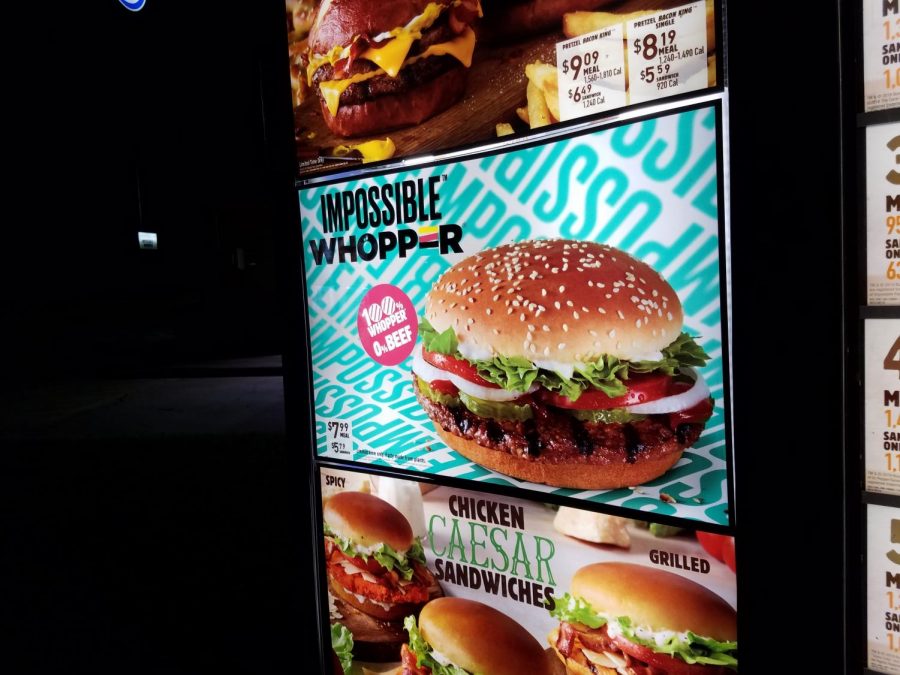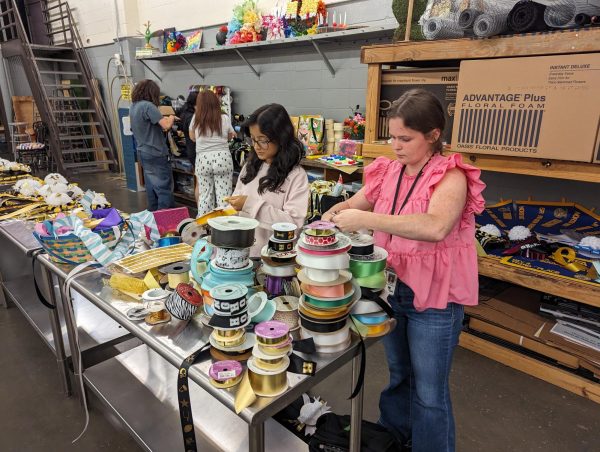Meatless Meat
Plant-based burgers make appearance at local fast food restaurants
Burger King’s outside menu boasts a large section showcasing the new Impossible Whopper alongside its traditional meat-based burgers.
Side by side, the burgers could be twins. Wrapped in the same grease-streaked papers and sandwiched in between identical golden sesame seed buns, it’s nearly impossible to discern the patties are polar opposites – one composed of meat and the other plants.
Vegan burgers like these are new contenders in the world of quick dining. With the addition of fake-meat at McDonalds, Burger King, and Red Robin in the past year, plant-based options have become more widespread than ever before.
Through the years, it’s been the norm for fast food restaurants to offer minimal vegetarian options. On most menus, meatless options consist primarily of side items including fries and hash browns or salads as the main entree.
“Usually when I go to fast food places, it’s difficult for me to look for good things I want to eat,” junior Sarayu Chebbi, a vegetarian, said. “I can’t usually have fast food that much because most of the time, I end up eating the same thing over and over again, and it gets bland.”
Beyond Meat and Impossible Foods strive to fill this gap for the plant-based consumer and make the dining experience more inclusive. They provide soy-derived burgers, meant to imitate both the flavor and appearance of beef, to fast-food chains. These meat substitutes appeal to a broader range than just those with dietary restrictions.
“I eat a lot of steak and meat in general, but I’d be interested in trying it,” junior Easton Gwamanda said. “I saw reviews online for the new vegetarian Whopper burger and they said it tastes like actual meat but even better than the original one.”
Along with a similar flavor, the plant-based burgers contain almost the same nutritional value. The Impossible Whopper from Burger King contains only 30 fewer calories than the standard beef Whopper, and six fewer grams of fat. With a lowered protein amount, too, the plant-based burger is not significantly healthier than its beef counterpart. According to some, that’s not a deal breaker.
“I believe everything should be taken in moderation,” junior Kadence Cobb said. “I don’t think it’s healthy to have either burger daily, but if choosing between fast food and the Beyond Meat burger, I would 100 percent choose the burger because it is so much better for our environment.”
The initial popularity of these fake meats from both vegetarians and meat-eaters alike led Beyond Meat to start off the summer with a rise in the stock market. However, according to a NASDAQ market summary, there has been a recent negative trend in their stock. This reflects some investors’ hesitancy to support the new plant-based meat companies.
“I wouldn’t invest in that stuff because none of my vegetarian friends want to eat it,” junior Rishabh Ghosh said. “It’s not about what I want, it’s about what they, the market, want. You’re not going to get the vegetarian or vegan population through Beyond Meat.”
Many vegetarians agree with this viewpoint and are turned away from the similarity of the plant-based burgers to beef.
“I’ve never tried it and I don’t plan to,” junior Jay Dileep said. “I don’t really want to eat anything that resembles meat. If I don’t eat meat normally, why would I want to eat something that tastes like it?”
Although the taste can be nearly identical to that of beef, the origin of the plant-based protein is rather different. Impossible Foods claims that their GMO soy, the base of their burgers, is more sustainable than beef from cows. This environmental draw entices a new crowd to the product.
“I’ve heard that eating plant-based alternatives for meat is good for the environment because it reduces CO2 emissions,” Chebbi said. “I’ve heard that plant-based is healthy, and I encourage a lot of people to eat it if it’s proven to be healthier than regular meat products.”
This potential for an environmental impact turns some fast food consumer’s routine stop into a planetary stand.
“It’s a great feeling knowing that you’re helping the environment, and you’re still able to enjoy the food you would eat on a normal basis,” Cobb said.










